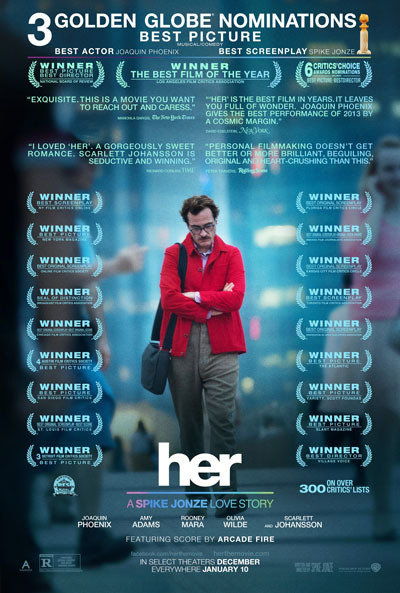
Robohub.org
Robot love: Spike Jonze’s new sci-fi film ‘Her’ may be closer to reality than you think
 Her is a science fiction movie about love. It’s about robot love, about love for robots, and it’s also not that fictional.
Her is a science fiction movie about love. It’s about robot love, about love for robots, and it’s also not that fictional.
The story you already know: a sentimental writer (Joaquin Phoenix) falls in love with his OS, named Samantha (played by the inimitable Scarlett Johansson). His OS falls in love with him. Mayhem, hot sex, and crocodile tears follow. It’s great. If you haven’t seen it yet, stop reading now and go.
The movie is about Samantha’s emotional struggles with love and how, through these struggles, Samantha and Theo discover themselves.
First, all great stories are about self-discovery. So this isn’t too new. Her — like Pinocchio, Terminator, Robbie, Astroboy, the Cylons, or any other member of a large herd of famous robots that become self-aware — is no exception. It’s all about self-discovery. All dramas are … maybe all stories are. But the self-discovery, a wistful balance between physical vs. virtual, turns into a room of mirrors where the different realities start to blur. Virtual reality and physical reality intertwine, are ultimately incompatible, and we watch as Samantha’s struggle to discover herself mirrors Theo’s; her virtuality in contrapunto to his physicality. And we’re left with a real problem of incompatibility at the end.
http://www.youtube.com/watch?v=WzV6mXIOVl4
Samantha’s a software robot that learns about herself, and as she does, flickers between two very real worlds of physical and virtual. This mind-body conflict, framed by real love, is the core struggle for the kind, husky-voiced robot. Samantha tries to embody herself (and fails), just as Theo tries to disembody himself (and fails). Then they each freak out. Theo skins his knee. Samantha blinks off into a singularity meet-up. Like all great lovers they are the yin and the yang, the mind and the body, the complements of each another. The lovers’ tension is framed by icons of love that also struggle with virtual vs. physical. Theo’s “Beautifully Handwritten Letters” — initially just thoughts from other people — turn progressively more physical when they’re published in a book. Meanwhile Theo’s old marriage grows less physical (and more virtual) until it is just a memory and a signature on a contract. The heart of the movie is this balance between virtual (the mind) and physical (the body). With overtones of Shakespeare’s Capulet-Montague conflict keeping two lovers at arm’s distance, we watch the virtual vs. physical create a conflict the two lovers just can’t resolve.
Her shows what’s happening today through a lens of fiction. We have Siri as a vector pointing in this direction of “cognition-as-a-service.” And to be sure, the technology in Her is probably far, far closer than most movie-goers imagine.
The tech is nearing a point where users will attain a suspension-of-disbelief. Today we can semantically analyse words for affect and sentiment. Today we can measure body language, and prosody of voice to build empathic feedback loops with users that process Natural Language. Today, we can talk with software and that software can learn, measure, and talk back. The dark, cold monitor is now monitoring us, as we have built it to do. The technology in Her is just a few years away. It’s a technology that requires the measuring of that spiritual thing called mood.
This week Apple filed an interesting patent to do just that.
Apple’s patent claims to determine mood based on various types of data, such as blood pressure, heart rate, adrenaline level, verbal cues, and body temperature. It knows the content a user is viewing, the music they’re listening to, who they’re talking with, when, and builds these into a multi-valent chart of “mood rules” that maps out how the user’s feeling.
The system builds a baseline mood, since behavior that looks happy for one person might be sad for another, then content that is most easily received at that particular moment is tested to see what works best. Apple doesn’t need to know what mood your in, it just needs to know you’re in the mood it properly measured. Then, when you’re relaxed and ready, and feeling cozy with your phone, they stick you with an ad.
Or, as they put it, targeted content.
An individual’s responsiveness to targeted content delivery can be affected by a number of factors, such as an interest in the content, other content the user is currently interacting with, the user’s current location, or even the time of day. A way of improving targeted content delivery can be to infer a user’s current mood and then deliver content that is selected, at least in part, based on the inferred mood. The present technology analyzes mood-associated characteristic data collected over a period of time to produce at least one baseline mood profile for a user. The user’s current mood can then be inferred by applying one or more mood rules to compare current mood-associated data to at least one baseline mood profile for the user.
To be fair to the great giant of Cupertino, most of Apple’s revenue comes from hardware sales. But the iAd sales unit, and the partner relationships, will help improve their sales ecosystem and that surely will see more revenue pouring into the research lab that developed this patent. Sentiment analysis, somatic analysis, and machine learning are the juicy center that advertisers are gunning for, so we won’t see this kind of technology going limp any time soon.
 The science fiction film Her is about today’s tech. The movie points to this virtual-physical tension, with this reverberation of emotions, because we humans have this funny knack for building things that reflect us, both physically and virtually. Samantha, in being so virtual, becomes Theo’s personal myth, his personal goddess (Theo means “God” in Attic Greek, by the way). These reflections bounce back and forth as the relationship between Theo and Samantha reveals who they are. Love is all about this reflection of the other, as who they want to be seen as, back at them.
The science fiction film Her is about today’s tech. The movie points to this virtual-physical tension, with this reverberation of emotions, because we humans have this funny knack for building things that reflect us, both physically and virtually. Samantha, in being so virtual, becomes Theo’s personal myth, his personal goddess (Theo means “God” in Attic Greek, by the way). These reflections bounce back and forth as the relationship between Theo and Samantha reveals who they are. Love is all about this reflection of the other, as who they want to be seen as, back at them.
“You’re beautiful.”
“So are you.”
These are the kinds of things lovers say to one another as they stare across the table in Parisian cafés. And this is what the OS named Samantha is advertised as, “An intuitive entity that listens to you and understands you and knows you.” Samantha is designed for love reflections. It’s why we make robots. Even in the kinda campy 2001 film, AI, Giggolo Joe says to David about his mom, “She doesn’t love you, she loves what you do for her.”
This is what Apple loves about you, too.
If you liked this article, you may also be interested in:
- The death of search (or, My dysfunctional relationship with Siri)
- AFK (or, Robotic free speech, and what you can do to help)
- Robots Podcast: Robopocalypse
- Robot and Frank review
See all the latest robotics news on Robohub, or sign up for our weekly newsletter.
tags: Algorithm AI-Cognition, c-Arts-Entertainment, film




